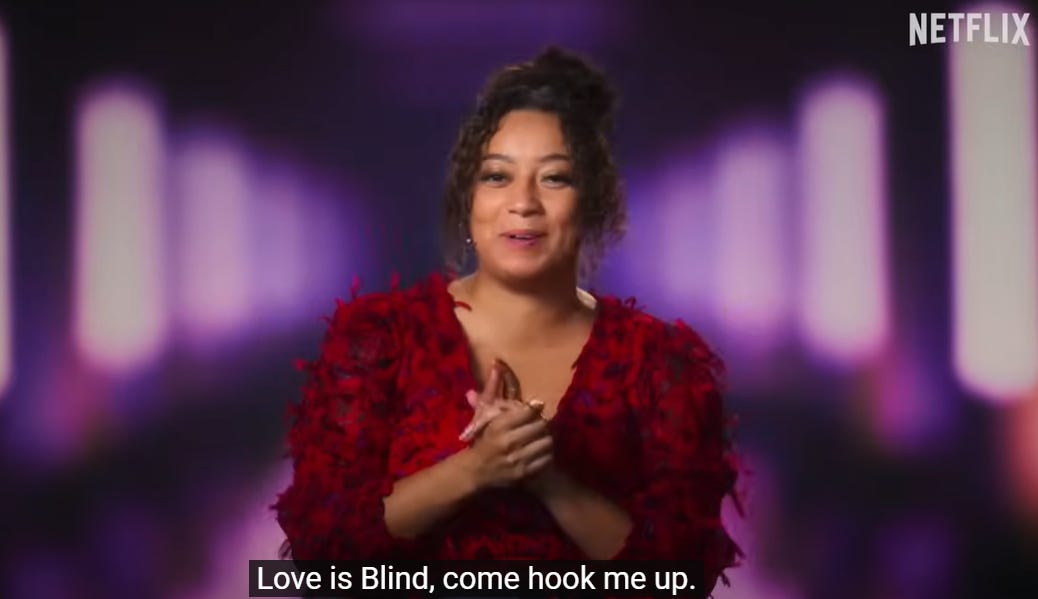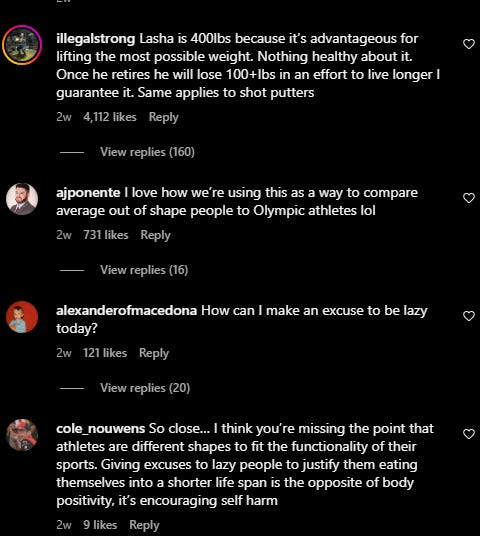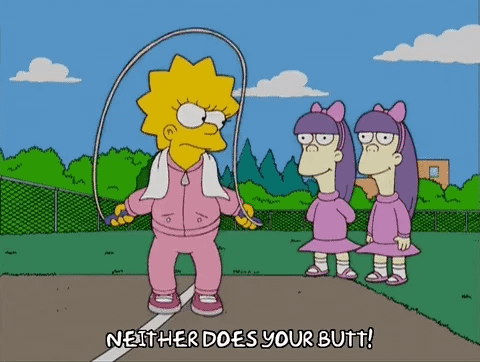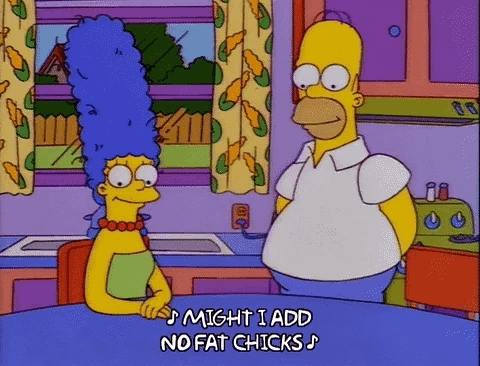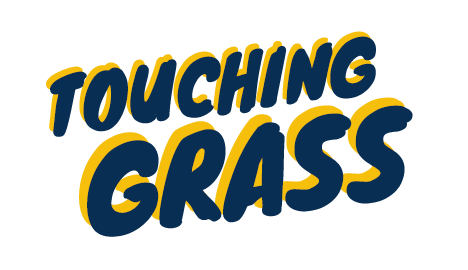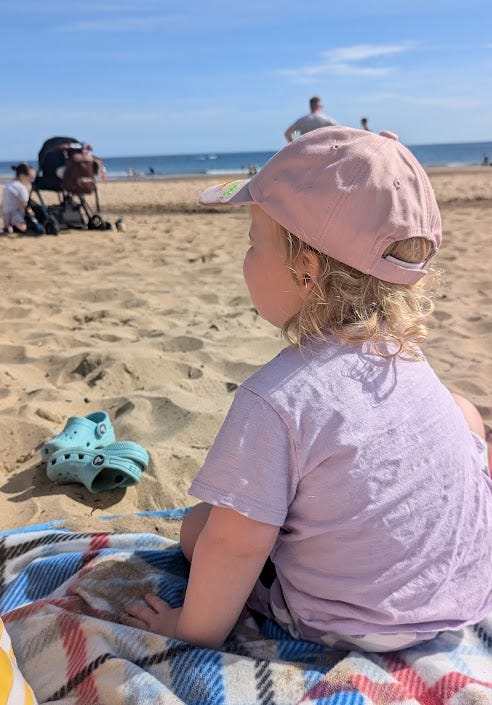I’m ashamed to say I've been fully absorbed in Love Is Blind UK this week. The Netflix reality show originated in the US, but this is the first series starring Brits who want to get engaged to someone without seeing their face. The show itself is trash. You have to watch it with a critical eye, knowing full well that many of the scenarios are ‘set up’. While reactions may be genuine, the producers will always choose entertainment over the contestants’ mental health. So, while I do watch this crap (and probably shouldn’t), I wasn’t going to let it go by without talking about some of the red-flag behaviours portrayed in the show “I love my food”Demi is a Londoner, a football player and a social butterfly. She openly discusses how she’s often perceived as “one of the guys” and is anxious to meet anyone she’s connected with in the dating pod because she “loves [her] food.” I had to double-take. This lass is already making excuses for her size, even though she is likely still smaller than the UK average. Regardless of whether she was in a larger body, we should never expect people to apologise for taking up space. And why is it always women who feel the need to do this? Obviously, we know the answer, as multiple generations of women have suffered at the hands of diet culture, raised by those who followed the Special K diet and watched Trinny and Susanna’s What Not To Wear. I have to take into account the editing, but it seems to me that Demi is positioned as the “fat one”. The thing is, in light of all her interests and passions, her size is the least interesting thing about her. We’re rewarded for shrinkingEven after four years of writing this newsletter, I have zero strategy for deciding what to write about. If I’m lucky, I write it on a Wednesday afternoon, ready for Thursday. If I’m unlucky, I write on Thursday morning and send it straight away. However, my brain is always thinking of ideas, and I keep all of these sparks of inspiration in the Keep Notes app on my phone. There is a note in there that says: “rewarded for shrinking.” I wrote it, and completely forgot what it meant— but the case of Demi on Love Is Blind just reminded me. Not only are we advised to take up as little space as possible, but we are rewarded for shrinking. This isn’t just about women, either. Society sets standards for all of us, male and female alike. It goes without saying that women have been subjected to the most aggressive dieting campaigns for over three decades, but fat-shaming affects men, too. Health = wealth?During the Olympics, body-positive influencers highlighted the huge variation in athletes’ bodies. Jonny Landels, a male body-positive influencer, created this excellent montage of true body diversity at the games. But remember, I live in an echo chamber. It only takes on visit to Jonny’s comments to see that not everyone agrees with his take. So, according to the commenters on Jonny’s post and other similar body-positive reels, the worst thing you can be is unhealthy. There are so many issues here, and it’s time to unpack them: Health is not a moral issueYour health does not make you a good person. If you are unhealthy, you are not less deserving of love or care. Otherwise, if this is the case, then are we saying that disabled people are worth less than non-disabled people? Does having a disease, physical impairment, chronic illness or mental health condition make you less worthy? Most good people would say no. And yet there are thousands of comments on videos like Jonny’s that are absolutely desperate to explain why not all Olympians are “healthy.” I wonder what they will all say when the Paralympics starts… will health become such a sticking point for them then? “Obesity is preventable”I know what you’re thinking: “But Ellen, you can’t compare obesity or another similar health condition to something like MS because that’s not their fault.” Is obesity our fault? Does it even matter? This attitude is rife on Instagram, where commenters will happily tell people to “just eat less and move more” like it’s some miraculous means of losing weight and becoming more healthy (and therefore socially acceptable). Firstly, it’s not that easy— especially for women. When it comes to weight gain, there are so many factors at play. Yes, lifestyle plays a role, but so do genetics, social class and the environment. Love Is Blind’s Demi later reveals she has endometriosis, a chronic illness affecting the female reproductive system. Women with endo experience hormonal fluctuations that can impact weight gain over time, and even make losing weight harder. Are we, as an audience, more sympathetic to Demi’s weight (I maintain she has no weight issues) if we know that it’s “not her fault”? And, if obesity is your fault, then why does it so aggressively impact some parts of society more than others? Government data shows obesity is highest in the most deprived areas. Interestingly, obesity peaks between the ages of 55 and 64 for both genders. Women are also less likely to be physically active. It doesn’t take a statistician to determine why this is. The mental load, pressures of domestic duties and lack of familial support all play a huge role in why women aren’t exercising. Studies show the chief reason is lack of time. Quelle surprise. I also suspect women’s motivation for exercise has been sullied by the burden of diet culture, forcing us to believe that any and all movement must be for the end goal of losing weight. This reminded me of our Demi for Love Is Blind, who is the only female contestant to openly talk about regularly playing sports, and yet she still feels as though she has to apologise for her body. Last year, I wrote about “being good” - and specifically the morality of diet culture language. I don’t think anything has changed here, with diet culture still using angelic imagery and virtuous language in its marketing, particularly when targeted towards women. Are we making any progress at all?In some ways, I worry we are not. But then I spot the likes of Kim Stacey, founder of Body Image Fitness, a non-diet fitness company based here in the North East. Kim explores the NHS weight stigma and the mental health impact of weight discrimination in her posts. She’s actively working to get people, especially women and non-binary folks, to enjoy the act of moving their bodies again. She wants to bring back joy in movement, and not punishment. Her classes are available online and in person. I highly recommend checking out her website (which we built, but this isn’t sponsored. Kim doesn’t even know I’m writing this!). I’d really like to hear from you in the comments section. Tell me ways in which you’ve felt you weren’t allowed to take up space, or how subtle comments have impacted your self-worth. Do you think people are less worthy if they aren’t deemed “healthy”? Or is this something we need to actively fight against? To me, this whole idea of certain people being more deserving of care is inherently ableist and discriminatory toward the most vulnerable people in society. Let me know below. Until today, we’ve had glorious sunshine here in the North East. I put my sensory issues aside (ew, sand) to take the little one to the beach at the weekend. She mostly just wanted to scoop sand and watch everyone else play. Things I’ve also enjoyed this week: 📚Educated by Tara Westover - I have no idea how I hadn’t heard of this memoir until recently, I spotted it ranked highly on the NY Times list of best books from the 21st century and decided to give it a go. Tara was raised by preppers— her parents were constantly preparing for the ‘end of times’, with constant fear and suspicion of wider society. She writes about the abuse she experienced at the hands of her brother and how, in spite of everything, she managed to achieve huge academic success but lost her family at the same time. I really, really recommend this. 📺 Love is Blind UK, obviously. See you next week, Ellen x 🎧I’m on Spotify!If you like the audio version of this newsletter, you can listen to them all over on Spotify. Here’s last week’s:
💌 About this emailI’m Ellen, and I write about mental health for the chronically online. I am a freelance copywriter, strategist and web designer, and I work from home with my husband, Craig, at Content By The Sea. We have two rescue greyhounds, Potter and Harmony, and a toddler. I started this newsletter in March 2020 and have sent over 180 emails; currently, I have over 1,200 subscribers. I write about a wide variety of topics, including diet culture, my love of running, jealousy, my life falling apart, mam guilt, and this dystopian world we all live in. 💛 How you can support meIf you like reading my weekly emails, you can give me a kickback in one or more of the following ways: 📨 Share this post 📬 Subscribe for free (if you haven’t already!) 💬 Leave a comment on this newsletter 💰Sign up to be a paid supporter of the newsletter for just £4 a month or £40 a year. The current perks of being a paid subscriber are receiving one extra Touching Grass email each month with all of my top films, shows, podcasts and books. And, most importantly, you are supporting me to keep writing this newsletter week after week. You're currently a free subscriber to Conversations By The Sea. For the full experience, upgrade your subscription. |

